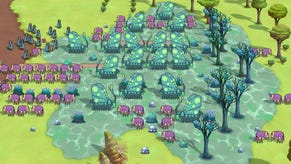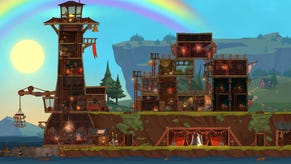Games Minus Stories = ?
There was one section of the interesting-but-incoherent Gamecrashers article, Games Will Never Be Mainstream, that had me thinking long into the night. Actually there were a couple of things that made me want to say something, including the fact that games seem to be mainstream now anyway, and particularly the claim that it would be “impossible” to turn Pride And Prejudice And Zombies into a game under a normal development cycle. Never say never. But anyway the bit that got me thinking was the one that said: “Games Are Rarely ABOUT Anything.”
What I take issue with here is the idea that stories are what games are about, or that they genuinely matter to the cultural significance of games. Stories can matter, and they can work brilliantly in a games' favour, but I think the reason why most games have paper-thin plots is because that's often all they need. (Yes, theme and story matter absolutely to comics, but they have limited additional formats/technologies/dimensions.)
The explanation for why games are rarely about anything in the way that books and movies are about something is because games are primarily about whatever it is that they model, rather than being about a theme embedded in their fiction. Games are models of something, in every case. They are “about” the systems and processes that they portray. Chess is about the antagonistic movement and positioning of the pieces on the 64 squares of the board, Portal is about teleportation and momentum through portals, Modern Warfare 2, as Mr Barrickman points out, is about shooting people. You could still argue that games aren't diverse enough in what they model, of course, but that's for another day.
“If games want to be taken seriously as art or a worthwhile storytelling medium, there will have to be more games that aren’t simple diversions.”
I think this claim is based on a mistaken analysis of why games have become popular at all. (Not to mention the idea of them being “simple diversions” - games without any story at all are often incredibly complex – but I will come back to that.) To see past this line of argument you only have to throw up some counter-factual ideas about what videogames - not simply the card or board games of earlier times - could have been, or what parts of them are. It's a thought experiment that I've often wanted to sketch up here for you guys to mull over, but never quite got around to it...
What if you removed the prefabricated story elements entirely from our contemporary caste of mainstream electronic games? What if there was no written or spoken exposition or explanation at all, only what the player did? No linear story-telling and no dialogue? What would we have left?
Well, you could still have most of the action and driving games. Especially Modern Warfare 2. Hell, you would have most of the Half-Life games. You would have Tetris, you would have Flight Simulators. Almost all multi-player games would spare us their incidental scene-setting twaddle. You would still have what is interesting about Eve Online: the activities of the players. Portal wouldn't be as funny, but it'd still be a fascinating puzzle game. You would have hundreds of different experiences, systems, visual themes, complex puzzles, strategic conundrums, ambient processes. Hell, you might end up having more originality and greater diversity if games weren't pinned down somewhere in the space between Aliens and Lord Of The Rings and trying to bend their game mechanics to their lack of articulacy in fiction. We'd lose RPGs, but we'd keep The Sims.
If there's a solution to this problem of games not being mainstream because of their crappy, subtext free stories, then perhaps we need to relent from the idea that stories are genuinely what makes games interesting. You don't have to look to far for concrete evidence of this. I see my ancient parents playing Boom Blox on their Wii and that scene looks pretty fucking mainstream. There isn't a story, and they aren't telling tales of Boom Blox exploits to their friends down at the Ornithology Society.
Anyway, to that issue of games being “diversions”. They can be just that. But so can films. The argument implied here is that games don't go beyond that into something deeper and more intellectually valuable. But perhaps that's missing the point about how novels or movies came to be what they are in the first place. These media were primarily about distraction or – more accurately in my mind – about escape. They were sold, heavily, as escapist past-times, and the majority of books and films are flimsy, lightweight adventures or romances. But nevertheless, in any form, they are still one step up from daydreaming. They are exercises and extensions for the imagination no matter how superficial that extension might be. These two particular media of paper and film - which have become so mainstream and so accepted culturally - focused on stories because human brains are great at storytelling. We are great at language. But we're not purely about language. There are other elements of culture that are being left out that don't tell stories, which are even non-linguistic, and which are also included within the remits of gaming: music, architecture, sculpture, physical or sporting achievement, feats of logical intellect, spatial exploration, or the pure experience of novelty. All these things connect with stuff that is utterly mainstream.
Stories, I think, are only supplementary to this bigger picture, the picture of films, books, the wider technologies of architectures, gadgets, vehicles, sports, video screens and the games we play on them as a larger continuum of stuff that takes advantage of our capacity for imagination. All these things, all of technology, acts as extension to cognition and consciousness. It's not just about the bit that interprets subtexts to give us depth of meaning within a story. Focusing on that narrow band of human achievement is asking for trouble. And saying that it is the gateway into what makes for mainstream games, well, I think that is mistaken too.









